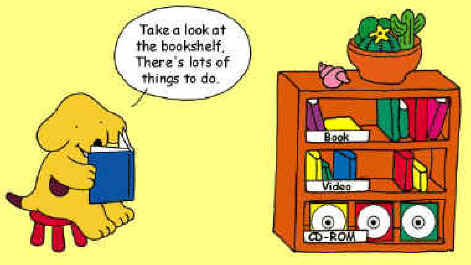I’ve been experimenting with providing library service in Second Life for about 6 months. In the last 12 months, the Second Life library has moved from a shopfront on someone else’s island to a 19 island archipelago staffed by over 500 librarians.
There are great benefits to librarians in getting a Second Life. There are limited benefits to our parent organisations and to our users – at the moment. The same thing happened when librarians first authored web pages – the first stage was learning how to do it, the second stage was others accessing our output.
With Forbes.com reporting last Tuesday that Gartner Says 80 Percent of Active Internet Users Will Have A “Second Life” in the Virtual World by the End of 2011 , we need librarians with the skills to understand virtual worlds.
Here’s my top ten list. Many of them depend on creating and maintaining social networks within Second Life.

1. Learn a new interface
Web browsing in the future won’t be identical to being in Second Life. It will probably have elements very similar to the 3D, social, immersive environment of Second Life. Learning how to put out objects, create environments, navigate and interact socially within this environment gives your librarians an edge to learn new web interfaces.
2. Learn to relate to your PC like our users who game.
Second Life – without rules, points, objectives and strategies – is not a game. It has many elements of gaming, however – you control a 3D representation of yourself that has an inventory and interacts with the environment and other people. We all have clients who game. Gaming can be used for recreation, leisure and – increasingly – to provide information. It is an alternate literacy that we should understand.
3. Fun and creative expression
I’ve had several librarians remark to me in Second Life , “I’m having the most fun I’ve ever had in my professional life”. You can build your ultimate library service. Don’t like something? Zap it and start again.
4. Break down professional isolation
Second Life librarians who are geographically isolated, work in one-person libraries or have highly specialised positions can go days without contact with another similar librarian. In Second Life, you can meet other professionals every day.
5. Increase coding skills
You can create a book, make the pages move, make it give out some written information when touched, or force someone’s web browser outside Second Life to a specified web page. There are people around to help and example scripts that you can use, but ultimately it becomes a fun challenge that increments your scripting skills without you even noticing.
6. It’s a collaborative learning community
There’s lots of librarians there. Via meeting in Second Life, the InfoIsland blog and the google group, we share ideas and work together on projects, such as a package of useful bits and pieces for people brand new to Second Life.
7. Networking about non – Second Life library matters
There are official programs about topics like MySpace and book discussion groups and author visits. Dave Pattern and I were chatting one night in Second Life about user ratings on OPACs. I sent him a link to our OPAC and after half an hour of coding, he’d coded a similar facility for his OPAC too.
8. Access to a host of experts – not just with Second Life skills
Within Second Life, I’ve met people who are experts in podcasting in libraries, and single person libraries and library instruction. It’s a helpful kind of place and it’s like having a panel of experts to call on if you get stuck at work in Real Life.
9. It’s free, we can access it now and it has first mover advantage
The Second Life interface is clunky and the environment boring to people used to gaming. There are better online virtual worlds. Second Life does have critical mass and is where you’ll find the most librarians experimenting. It’s free and we can get on right now.
10. Flexibility of thought and learning
Once the tools of librarianship, like AACR and LCSH, were standardised, and could be taught in library school. Our toolkit is now rapidly evolving to include blogs, wikis, multimedia and social software tools. We need people with nimble, exercised minds who are able to adapt to a new environment. There are a hundred different ways to join people with information within Second Life. To do this successfully, librarians need to decide what they need to know, work out how they are going to learn it and find the resources available – including other people – to create the tools they need. This assessment and assimilation of new tools is a transferable, valuable skill that applies beyond the PC.
To give a bit of balance, my next post outlines six very bad reasons to have a library branch in Second Life.





